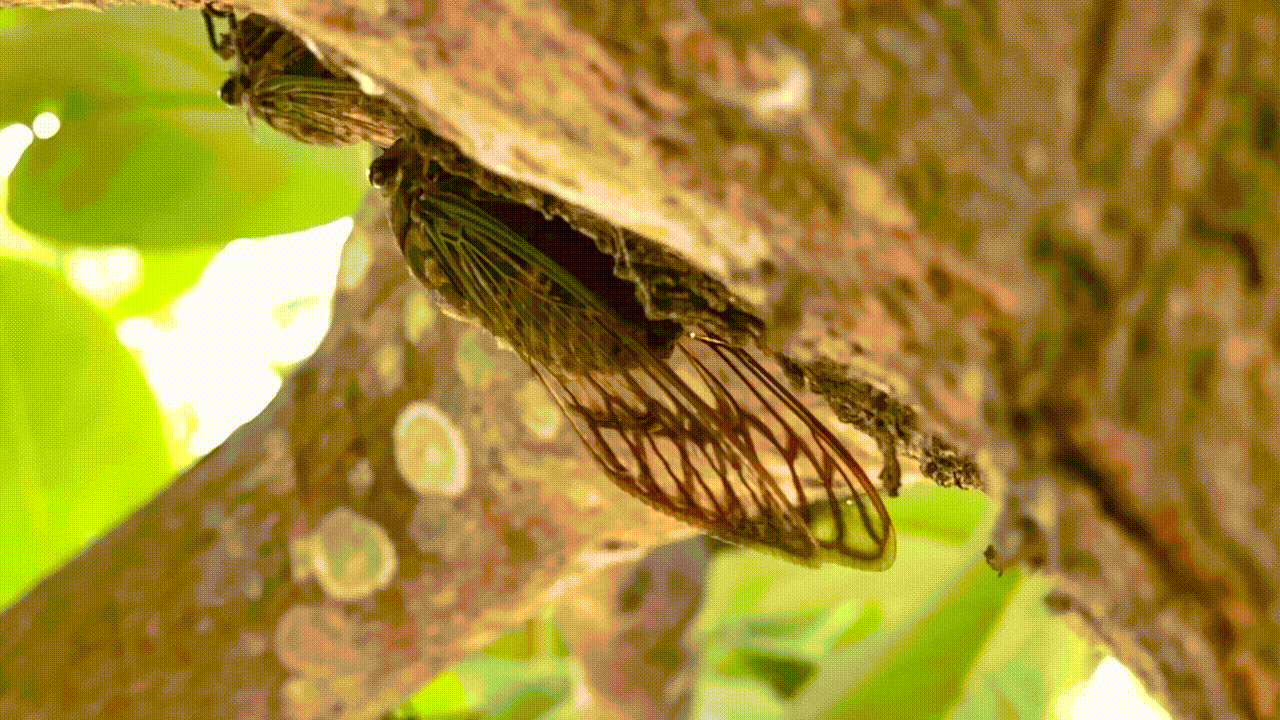Insects
Hibernating Bumblebee Queens Can Survive Underwater for Up to a Week, Study Finds
Researchers discovered the insects’ unexpected superpower during an accidental laboratory snafu
Why Do So Many Beetle Species Exist?
Diet played a key role in the evolution of the vast beetle family tree
Up to a Trillion Cicadas Could Emerge in the U.S. Later This Spring
Two specific broods will appear together for the first time since 1803
Five Fascinating Science Projects Using the Total Solar Eclipse to Illuminate New Discoveries
The NASA-supported experiments are mobilizing legions of researchers and volunteers to capture wide-ranging observations during totality, from amateur radio operations to elusive solar plumes to unusual animal behavior
Don't Look Up: Cicadas Produce High-Speed Jets of Urine
The noisy, winged insects produce pee the same way that much larger animals do, according to a new study
See Incredible Insects Up Close With These Creepy-Crawly Photos
Bug out with 15 shots of insects and arachnids of all shapes and sizes from the Smithsonian Magazine Photo Contest
Giant Locust Swarms Could Expand to New Areas With Climate Change, Study Suggests
In the coming decades, erratic periods of rain and drought could create new hot spots for the ravenous grasshoppers in west India and west central Asia, threatening crops and food security
Where Did Butterflies Come From? This Scientist Is On the Case
Akito Kawahara has spent his life devoted to lepidoptera. Now he’s correcting the record on where they first evolved
Earth’s Migratory Animals Are in Peril, According to U.N. Report
The Convention on Migratory Species warns that many birds, mammals and fish face numerous threats, but they can be saved
Air Pollution Makes Flowers Smell Less Appealing to Pollinators, Study Suggests
Nocturnal hawk moths are less likely to visit primroses in air polluted by nitrate radicals, which break down important wild fragrances, researchers find
Monarch Butterflies Wintering in California Are Down 30 Percent From Last Year
The insects' population is slowly rebounding from a historic low in 2020, but they remain in crisis, having declined by more than 95 percent since the 1980s
Why Are Flying Insects 'Attracted' to Lights? Scientists May Finally Have an Answer
Moths and other insects might turn their backs toward the brightest source of light around—which has historically been the sky—to determine which way is up and which is down, according to a new paper
Scientists Build a Robot Dinosaur to Probe the Mystery of Tiny Wings
Robopteryx—a makeshift dinosaur with training wheels—offers clues to the purpose of prehistoric proto-wings, which are too small to have powered flight
See 11 Winning Images From the Close-Up Photographer of the Year Awards
Focused on little details of animals and plants, these stunning shots spotlight the world’s tiny wonders
Cicadas Are Coming: Rare 'Dual Emergence' Could Bring One Trillion of the Bugs This Year
The 13-year and 17-year broods that will emerge from underground this spring will be appearing together for the first time in 221 years
The Scientist Using Bugs to Help Solve Murders
At crime scenes around the world, the forensic entomologist Paola Magni is taking her field into uncharted waters
See 25 Breathtaking Images From the Wildlife Photographer of the Year Contest
Representing some of the world's best nature photography, the pictures are being put to a popular vote for the People's Choice Award
These Ants Can Diagnose and Treat Their Comrades' Infected Wounds
Matabele ants in sub-Saharan Africa often sustain injuries while hunting termites—and their survival strategy may help humans fight infections, too
Seven Scientific Discoveries From 2023 That Could Lead to New Inventions
Biologists learned lots about animals and plants this year, and their findings could inspire better robots, medicine and environmental technologies
Male Mosquitoes May Have Once Sucked Blood, Amber Fossils Suggest
Today, only female mosquitoes feed on the blood of animals, while males are satisfied with plant juices
Page 3 of 33
:focal(1194x921:1195x922)/https://tf-cmsv2-smithsonianmag-media.s3.amazonaws.com/filer_public/c2/f1/c2f1bfd0-7ad5-4a48-8265-45f8f45901a9/common_eastern_bumble_bee_in_central_park_25454.jpg)
:focal(800x602:801x603)/https://tf-cmsv2-smithsonianmag-media.s3.amazonaws.com/filer_public/3a/ce/3ace8da0-ae7a-48df-a5e2-ae05bf005fbb/gettyimages-697024166_web.jpg)
:focal(2567x1711:2568x1712)/https://tf-cmsv2-smithsonianmag-media.s3.amazonaws.com/filer_public/06/d6/06d6edc9-cdfa-4bb9-8caf-afb524852213/gettyimages-1321221953.jpg)
:focal(450x339:451x340)/https://tf-cmsv2-smithsonianmag-media.s3.amazonaws.com/filer_public/b4/37/b4370cf8-9d77-4795-a3fa-63c5549e5c5b/ezgif-7-192a70d806_cropped.jpg)

:focal(2596x1693:2597x1694)/https://tf-cmsv2-smithsonianmag-media.s3.amazonaws.com/filer_public/92/a3/92a3eec2-335b-4d8c-8100-e27f3d1b3242/1_-_371e7f94-7d50-4b2c-8c08-0b911bf6ca3e_copy.jpg)
:focal(1082x690:1083x691)/https://tf-cmsv2-smithsonianmag-media.s3.amazonaws.com/filer_public/f6/c2/f6c21b45-dc2c-4758-aeff-f1ed552f8b00/gettyimages-114413730.jpg)
:focal(1133x761:1134x762)/https://tf-cmsv2-smithsonianmag-media.s3.amazonaws.com/filer_public/c2/e6/c2e62a59-37f8-4b30-bf6f-3ddde26c8fa5/mar2024_c03_prologue.jpg)
:focal(800x602:801x603)/https://tf-cmsv2-smithsonianmag-media.s3.amazonaws.com/filer_public/63/17/631720ea-a7b8-4867-926b-81836d8a87c1/gettyimages-1621490545_web.jpg)
:focal(570x369:571x370)/https://tf-cmsv2-smithsonianmag-media.s3.amazonaws.com/filer_public/12/15/12156084-7777-4bd7-9405-31669701c7d5/moth_1.jpg)
:focal(2115x1309:2116x1310)/https://tf-cmsv2-smithsonianmag-media.s3.amazonaws.com/filer_public/e1/d2/e1d25e58-318e-4b50-a0d1-edfb2f7da85e/gettyimages-1242116260_1.jpg)
:focal(500x336:501x337)/https://tf-cmsv2-smithsonianmag-media.s3.amazonaws.com/filer_public/36/19/3619a89a-cbc3-422c-8175-51ae4ca4e4dc/back-insect.jpg)
:focal(1154x659:1155x660)/https://tf-cmsv2-smithsonianmag-media.s3.amazonaws.com/filer_public/5c/e2/5ce2054c-b4af-4bc3-9e6c-5983a5dcf1bc/gettyimages-594380985.jpg)
:focal(512x322:513x323)/https://tf-cmsv2-smithsonianmag-media.s3.amazonaws.com/filer_public/72/a1/72a18732-777d-4a8f-9695-c0771163c0d7/butterflies-1st-csaba_daroczi-the_wedding_guest-cupoty_5-web.jpg)
:focal(1024x683:1025x684)/https://tf-cmsv2-smithsonianmag-media.s3.amazonaws.com/filer_public/15/cb/15cb58f4-3e10-4b7d-81f9-d678f4c2f110/3028327979_5504d892e1_k.jpg)
:focal(2250x1693:2251x1694)/https://tf-cmsv2-smithsonianmag-media.s3.amazonaws.com/filer_public/63/15/6315c267-0a48-4ca5-a557-dfb02334f1b3/opener_-_janfeb2024_c06_paolamagniforensics.jpg)
:focal(640x427:641x428)/https://tf-cmsv2-smithsonianmag-media.s3.amazonaws.com/filer_public/4c/09/4c09c899-bdf5-4c8f-b2c8-dd9e0cb6cf8d/tzahi_finkelstein_wildlife_photographer_of_the_year.jpg)
:focal(640x396:641x397)/https://tf-cmsv2-smithsonianmag-media.s3.amazonaws.com/filer_public/b1/d7/b1d7a054-f8e7-4abb-981e-59c4c3931bf8/csm_0102ameisenerkennen1www_9587540f09.jpg)
:focal(960x649:961x650)/https://tf-cmsv2-smithsonianmag-media.s3.amazonaws.com/filer_public/52/0c/520c1e9a-9a4e-4182-a0e6-2530427f0848/monarch-butterfly.jpg)
:focal(2750x1781:2751x1782)/https://tf-cmsv2-smithsonianmag-media.s3.amazonaws.com/filer_public/4b/2b/4b2b929b-94dc-45f7-add4-c6373db676f8/gettyimages-540806304.jpg)